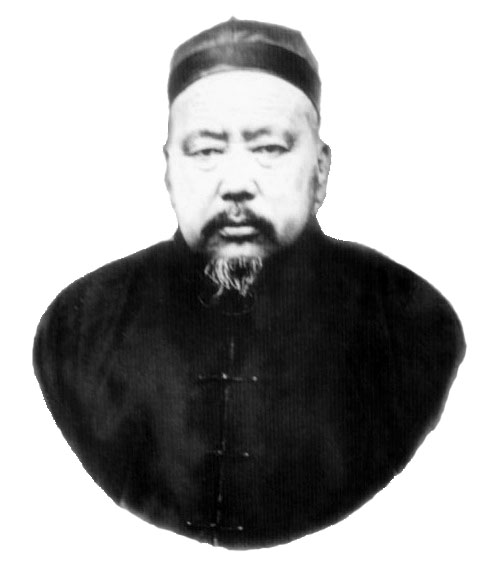<Back to Index>
- General of the Ninghai Army Ma Qi, 1869
PAGE SPONSOR

Ma Qi (23 September 1869 – 5 August 1931) (simplified Chinese: 马麒; traditional Chinese: 馬麒) was a Chinese Muslim warlord in early 20th century China.
A Hui, he was born in 1869 in Daohe, now part of Linxia, Gansu, China. His father was Ma Haiyan. He was senior commander in the Qinghai - Gansu region ever since the late Qing times.
Ma Qi lead loyalist Muslim troops to crush Muslim rebels during the Dungan Revolt (1895).
During the Boxer Rebellion, Ma Haiyan defeated the foreign army at the Battle of Langfang, and died in 1900 while protecting the Imperial Family from the western forces. Ma Qi succeeded him in all his posts and capacities. Ma Qi was six feet tall, and maintained the mintuan militia in Xining as his personal army, called the Ninghaijun.
Ma Qi also directly defied his commanding officer, the Muslim General Ma Anliang, when Ma Wanfu, the Muslim brotherhood leader, was being shipped to Gansu from Xinjiang by Yang Zengxin, to Ma Anliang, so Ma Anliang could execute Ma Wanfu, Ma Qi rescued Ma Wanfu by attacking the escort and brought him to Qinghai. Ma Anliang hated Muslim brotherhood, which he banned earlier, and sentenced all its members to death, and wanted to personally execute Ma Wanfu because he was its leader.
During the Xinhai Revolution, Ma Qi easily defeated Gelaohui revolutionaries in Ningxia, sending their heads rolling, but when the Emperor abdicated, Ma Qi declared support for the Republic of China. Unlike the Mongols and Tibetans, the Muslims refused to secede from the Republic, and Ma Qi quickly used his diplomatic and military powers to make the Tibetan and Mongol nobles recognize the Republic of China government as their overlord, and sent a message to President Yuan Shikai reaffirming that Qinghai was securely in the Republic. He replaced "Long, Long, Long, Live the reigning Emperor", with "Long live the Republic of China" on inscriptions.
Ma Qi developed relations with Wu Peifu, who tried to turn Gansu military
leaders against Feng Yuxiang. Feng's
subordinate, Liu Yufen expelled all the Han Generals who
opposed him, which resulted in Hui Generals Ma Hongbin, Ma
Lin, Ma Tingxiang, and Han General Bei Jianzhang, the
commander of a Hui army, to stop fighting against Feng and
seek an agreement.
Ma Qi formed the Ninghai Army in Qinghai in 1915.
Ma Qi occupied Labrang monastery in 1917, the first time non Tibetans had seized it.
After ethnic rioting between Muslims and Tibetans emerged in 1918, Ma Qi defeated the Tibetans. He heavily taxed the town for 8 years. In 1925, a Tibetan rebellion broke out, with thousands of Tibetans driving out the Muslims. Ma Qi responded with 3,000 Chinese Muslim troops, who retook Labrang and machine gunned thousands of Tibetan monks as they tried to flee. Ma Qi besieged Labrang numerous times, the Tibetans and Mongols fought against his Muslim forces for control of Labrang, until Ma Qi gave it up in 1927.
Ma Qi defeated the Tibetan forces with his Muslim troops. His forces were praised by foreigners who traveled through Qinghai for their fighting abilities.
However, that was not the last Labrang saw of General Ma. Ma Qi launched a genocidal war against the Tibetan Ngoloks, in 1928, inflicting a defeat upon them and seizing the Labrang Buddhist monastery.
After the founding of the Republic he was governor of Qinghai from 1915 to 1928 and the first chairman of the government of Qinghai from 1929 to 1931. After Chiang Kai-shek gained control nationwide, he became a brigade commander, and then was promoted to commander of the 26th Division of the National Revolutionary Army in the northwestern region. His civil posts also included director of the Gansu Bureau of Construction. Ma Qi is the father of Ma Bufang and Ma Buqing, and uncle of Ma Zhongying. He died on 5 August 1931 in Xining, Qinghai, China.